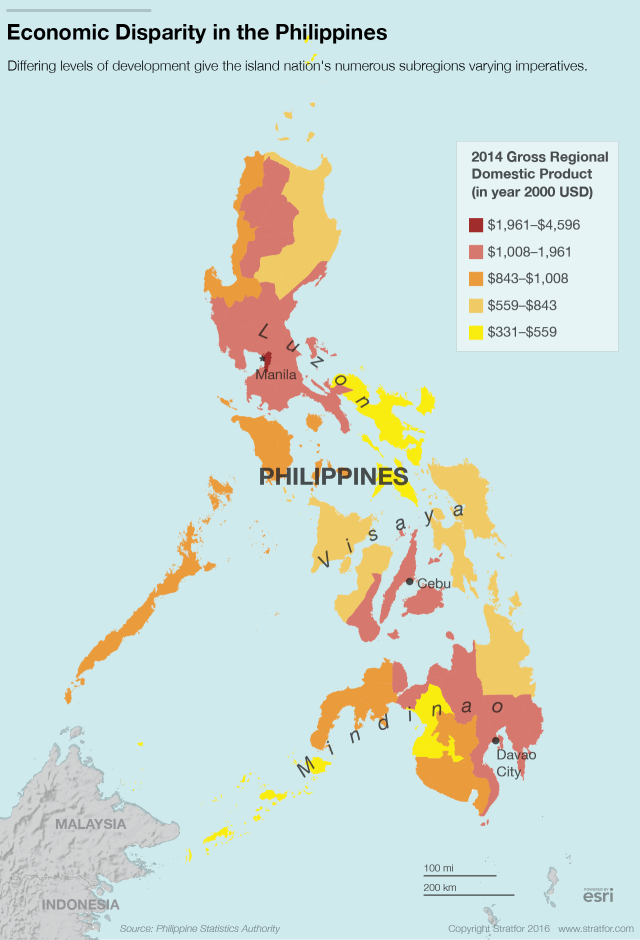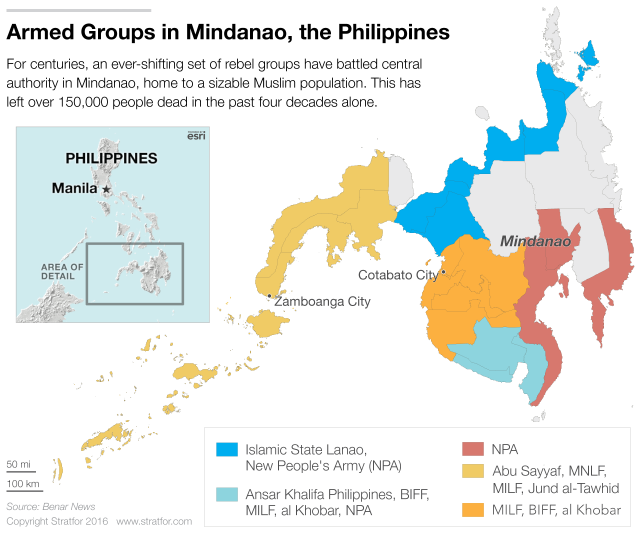Forecast
- As a political outsider, new President Rodrigo Duterte will use his populist crackdowns on crime to build up his own political power base in the capital.
- Though popular now, his drug war will risk provoking a public backlash and alienating the Catholic Church.
- A loss of political support in Manila would threaten his ambitious initiatives in the Philippines' outlying regions.
Analysis
The multifront offensive is heavy on populist theatrics, but there is method to Duterte's apparent madness that reflects the country's core geopolitical imperatives. To project power across the fragmented string of islands and address the numerous internal and external threats to the country, the president is moving quickly to dislodge what he sees as obstacles to his administration's authority. Nonetheless, Duterte's willingness to make enemies is liable to spark major instability.
Manila's Geographic Challenge
The Philippines has always been an exceedingly difficult place to govern. This is due in large part to the country's fractured geography, populated by numerous linguistic and ethnic groups. A mountainous archipelago of more than 7,000 islands, the country can be divided roughly into three island clusters, each with distinct economic and cultural identities and internal ethnic fractures.
The northern island grouping, Luzon, is inhabited primarily by ethnic Tagalog, who migrated from China and Southeast Asia. This region's economic and cultural connections stretch primarily north to mainland Asia. Nearly 1,600 kilometers (1,000 miles) south is the restive region of Mindanao, home to a complicated patchwork of rival clans and ethnic groups, including Muslim Moros. Most of these have far more in common culturally and ethnically with Indonesia and Malaysia than with the northern Philippine islands. The linchpin of the nation is a region known as the Visayas, home to the country's largest ethnic group, the Visayans.
.png)
In the modern era, all Philippine central governments have struggled to enforce their writ over this fractured landscape, particularly in the country's outlying regions. Clans, oligarchs, industry barons and militias still hold local power over political, business and security matters. These local stakeholders weaken institutions and undermine law and order, yielding a decentralized political system in which Manila struggles to carry out the critical functions of governance. This, in turn, deters foreign investment and economic development, fueling the cycle of instability.
Decentralization and a weak government also undermine border security. The Philippines' position along major sea lanes makes it a natural transshipment point for black market flows. This is compounded by proximity to far-flung, loosely governed regions of Malaysia and Indonesia. The resulting dynamic is simple: Drugs and weapons flow in; natural resources and untaxed exports flow out.
To combat the resulting organized crime, smuggling and insurgency, Manila has to remain inwardly focused. This comes at the expense of pressing external issues — especially securing its interests against China in the South China Sea. And as an archipelagic nation, the Philippines needs to press its maritime interests against external powers to maintain its key lifelines, fishing and seaborne trade.

The new president has thus inherited the Philippines' two core geopolitical imperatives. The first is to unite the disparate islands under a central authority. Success here is critical to fulfilling the second: securing the territorial integrity of the Philippines. Duterte's war on social ills plays into both of these.
Duterte's Strategy
Formerly the mayor of Davao City, a port city in Mindanao, Duterte (a Visayan Christian) is perhaps uniquely well-versed with the complicated realities of governing the Philippines' far-flung regions. But as the first president from the south, he's also poorly positioned to unite Manila behind his plans. His arrival is inherently disruptive to the entrenched power structures in Manila, and he did not inherit the sort of party machinery he needs to compel the bureaucracy, judiciary and security forces to carry out his priorities. (Typically, outsider reformist leaders like Duterte end up having to cede quite a bit of power to career technocrats and bureaucrats to keep the government from grinding to a halt.) And for the central government to assert its authority across the country, it can ill-afford to be on uneven footing in the capital.
Thus, Duterte's early moves are, in part, an attempt to consolidate power in Manila. He is capitalizing on his present popularity while laying the foundation he thinks is key to the country's long-term modernization. For example, his tactic of calling out allegedly corrupt officials and business leaders is a way to help him build public support and keep potential rivals at bay, in a manner similar to Xi Jinping's anti-graft campaign in China. The truth of his accusations — and the collateral damage and human rights abuses they may bring — matter little so long as he continues to be seen publicly as the antidote to the country's overwhelmed legal system, sclerotic public institutions and corrupt elites. Throughout his career, voters have only rewarded his bluster and willingness to take on entrenched powers.
The popularity of the war on crime, Duterte hopes, will buy him time to remake the power landscape in the capital. This will mean gaining a tighter hold on the sources of patronage needed to sustain a political coalition, while also building credible institutions worthy of the public's trust. Over the long term, he thinks voters and foreign investors alike will reward his focus on law and order, even if it brings with it a temporary spike in bloodshed and is enforced with extralegal means.
Success here would support the Duterte government’s second imperative: securing the country’s territorial integrity, at least internally. Central to Duterte's agenda are his efforts to bring an end to two conflicts: the world's longest-running communist insurgency and an age-old separatist conflict waged by Moro Muslim rebel groups in Mindanao and the Sulu Archipelago.
The violence marring the Philippine countryside has deterred much-needed investment and rural development, particularly in the resource-rich south. In Mindanao, the conflicts have fueled piracy and organized crime and sowed the seeds for the rise of jihadist groups such as Abu Sayyaf. Moreover, addressing the violence takes up an outsize share of the military's limited budget, keeping the armed forces focused on internal stability rather than external and maritime defense.

Duterte tends to frame the conflicts in socio-economic terms, and he is pursuing several ambitious initiatives aimed at mitigating them, including holding comprehensive peace talks and, more notably, establishing a federalist form of government to cede power to the Philippines' far-flung regions. But these efforts will not be successful without sustained support in the capital and from security forces. Local clans and oligarchs — some of which have become wealthy and well-armed via black market dealings — also have the power to spoil the new president's agenda.
Risks
Duterte is a remarkably savvy politician, and he has gained powerful patrons since taking office. During his tenure as mayor of Davao City, he proved adept at balancing local interests while silencing those arrayed against him without provoking a major political backlash. But as president, this will be quite a bit more difficult.
The primary risk is that Duterte will open up power struggles on too many fronts and find himself at odds with too many powerful enemies, leading to political instability such as that which plagued the Philippines from the late 1980s through the early 2000s. His ambitious initiatives will run into resistance from bureaucracy and the courts, as well as elements in the four pillars of political power in the Philippines: the church, the military, the business community and organized labor.
Already, for example, the military is suspicious about Duterte's peace initiatives and his naming of communists to his Cabinet, along with his intention to reorient and scale back the military modernization drive launched under his predecessor, Benigno Aquino III. With Duterte turning his focus to issues such as tax evasion and stricter enforcement of environmental and labor regulations, he is liable to lose support among some industry leaders. Figures from any of these camps who have a hand in the drug trade — not to mention powerful organized crime elements — will be particularly keen to thwart the president. Even before Duterte's inauguration, a group of crime bosses purportedly placed a bounty of more than $1 million on the president-elect's head.
Meanwhile, the extrajudicial killings of drug suspects has provoked criticism from the church and civil society groups, as well as the United Nations and the United States. The fight Duterte has initiated against illicit drugs is indeed one he will struggle to keep under control, as it is likely to stir power struggles and unleash waves of score-settling violence among rival factions. It may also inadvertently strengthen the empires of some corrupt police, soldiers and government officials who are involved in the drug trade. All told, the violence is likely to get worse before it gets better, and the more seemingly innocent bodies pile up, the more the church and public may turn against him.
For now, Duterte is riding sky-high approval ratings, and a sizable majority of Philippine lawmakers defected to his ruling coalition shortly after the election. He has also gained the support of establishment power brokers such as the Marcos family. But the relative stability of the past decade is still a rarity in Philippine politics, and the office of the president remains a precarious one. Since the fall of longtime strongman Ferdinand Marcos in 1986, presidents have routinely stared down coup plots, grappled with the judiciary and the oligarchs, and seen their agendas succumb to popular unrest.
Any substantial loss of public support — say, if Duterte's agenda fails to produce sustained and more equitable economic growth — would once again expose the underlying power dynamics in the capital, threatening, at minimum, the most ambitious parts of Duterte's agenda. Governing by force of personality will not prove sustainable if it is not accompanied by the development of credible institutions. And an embattled central government in Manila will not be able to fulfill its geopolitical imperatives in the outlying regions. The sources of the country's deeply ingrained unruliness will not go quietly.
Strategic Review has a content sharing agreement with Stratfor global intelligence







%20resized.png)
